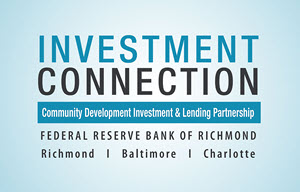With its Investment Connection program, the Richmond Fed matches nonprofits and other community and economic development organizations with banks and other financial institutions, similar in concept to the television show "Shark Tank." Investment Connection brings organizations and bankers together by hosting in-person and virtual events where community-based organizations pitch eligible project ideas to financial institutions and other funders seeking to invest in the region. Investment Connection also provides an online portal where funders can look at proposals, filtering them by geography, type of project, or type of investment.
Within the Federal Reserve System, the regional Reserve Banks work with both community development groups and financial institutions, so they are positioned to bring banks together with nonprofits and other community and economic development organizations. The Kansas City Fed piloted the Investment Connection program in 2011. Since then, five other Reserve Banks, including the Richmond Fed, have launched Investment Connection programs. Investment Connection in the Fifth District began in 2019 and currently operates in Maryland, North Carolina, Virginia, Washington, D.C., and West Virginia; later this year, the program will expand into South Carolina.
The first step for organizations to become involved in Investment Connection is to submit a proposal, which must fall into at least one of the following categories: affordable housing, economic and workforce development, financial access and empowerment, small business and small farm technical assistance and development, community facilities and services, or neighborhood revitalization and stabilization.
From there, the Investment Connection team and the Richmond Fed's Supervision, Regulation and Credit (SRC) bank examination staff review applications to determine whether the proposals are compliant with the Community Reinvestment Act (CRA). The CRA requires financial institutions to show that they are providing credit to low- and moderate-income communities, so banks have an interest in adding positively to their CRA records. The SRC staff ultimately reviews the proposals to eliminate some degree of uncertainty for funders, an unusual setup. "The SRC staff are looking at proposed projects before the banks have seen them," says Peter Dolkart, the Richmond Fed's community development regional manager for Maryland and metropolitan Washington, D.C. "What that does is remove some of the guesswork for the banking institutions so that they are better equipped to evaluate a project's potential for CRA credit."
After the SRC and Investment Connection teams review the proposals, the organizations are invited to present their proposals to funders during in-person and virtual events and through the online portal. "The pitch sessions were originally intended to be done in person, 'Shark Tank' style," says Dolkart. "We did our first sessions like that in November 2019, and we were planning to go forward and continue that way in 2020, but the pandemic changed them to virtual sessions."
In one of the first rounds of Maryland pitch sessions in late 2019, an organization from Minnesota called PCs for People, a nonprofit that refurbishes and delivers computer equipment to people who could not other-wise afford it, pitched its ideas to potential funders. Through Investment Connection, PCs for People was able to make several contacts to obtain funding. Last year, it expanded into Maryland and has since provided more than 900 computers and other equipment to low-income students and their families in Baltimore City.
Similarly, during a Virginia pitch session in November 2020, the Blue Ridge Habitat for Humanity in Winchester, Va., presented a proposal to construct new affordable housing in Norris Village, a cottage community. They received $500,000 to build five 1,200-square-foot single-family homes for low- to moderate-income families. Construction of these homes is expected to begin in 2021, and they will be purchased by approved Habitat families when they are finished.
Despite the delays and obstacles caused by the COVID-19 pandemic, the Richmond Fed is optimistic about the program's future. "The future of Investment Connection will be to complement and build on an existing funding ecosystem and to identify projects more in rural areas," says Dolkart. "I think we are going to become a valued tool in terms of identifying where there is a need in rural areas and an asset to existing successful startup programs to enhance what they are doing."




